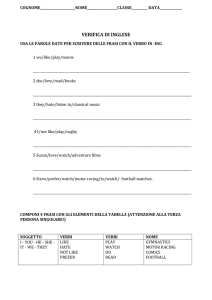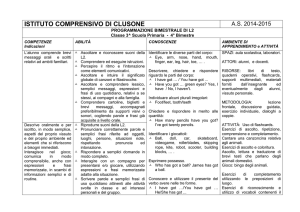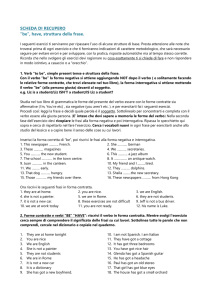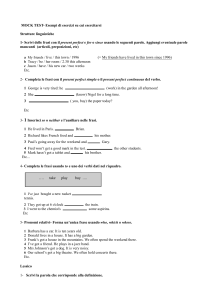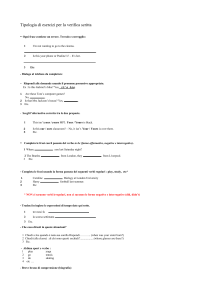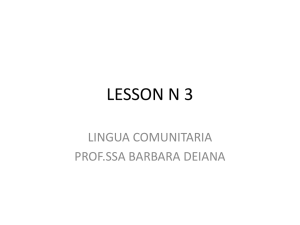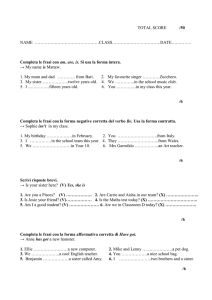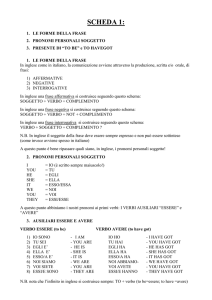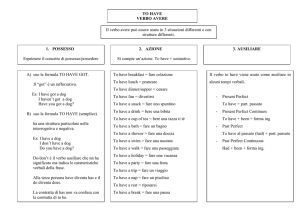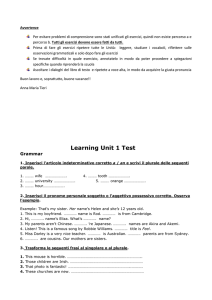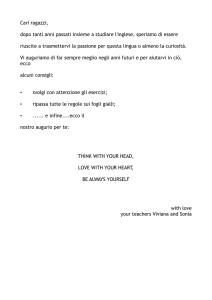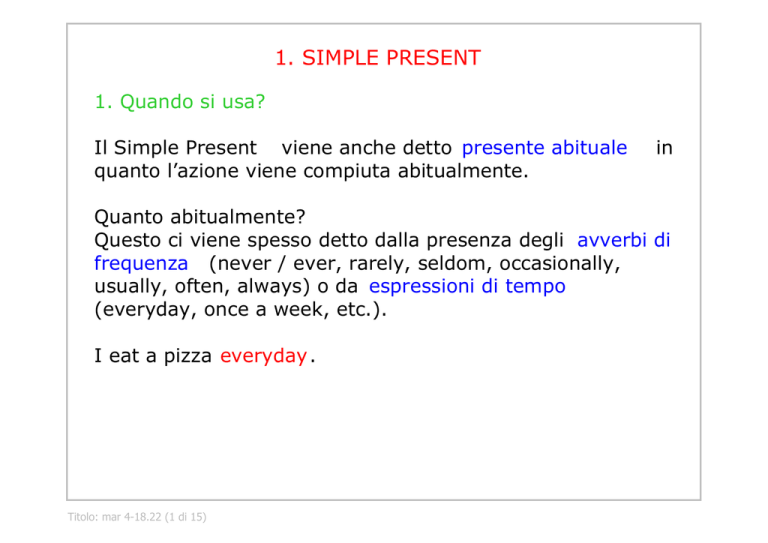
1. SIMPLE PRESENT
1. Quando si usa? Il Simple Present viene anche detto presente abituale
quanto l’azione viene compiuta abitualmente.
in Quanto abitualmente?
Questo ci viene spesso detto dalla presenza degli avverbi di frequenza (never / ever, rarely, seldom, occasionally, usually, often, always) o da espressioni di tempo (everyday, once a week, etc.).
I eat a pizza everyday.
Titolo: mar 4­18.22 (1 di 15)
A seconda del modo di creare una frase interrogativa e negativa i verbi possono dividersi in due gruppi principali:
1. Simple Present: verbs: to be (essere), to have (avere), can (potere / saper fare
);
2. Simple Present: all the other verbs (to play, to drink, to watch…).
Titolo: mar 4­18.23 (2 di 15)
SIMPLE PRESENT
VERBS
1. TO BE
2. TO HAVE
3. CAN
ALL THE OTHER VERBS
1. PLAY 2. WRITE
3. EAT
Interrogative sentences
1. ARE YOU ITALIAN?
2. HAVE YOU GOT A DOG? 3. CAN YOU SKI?
1. DO YOU PLAY TENNIS?
2. DO YOU WRITE A LETTER?
3. DOES SHE EAT PASTA?
Negative sentences
1. You are not (aren't) Italian
1. YOU DO NOT (DON'T) PLAY TENNIS
2. You have not (haven't) got a dog 2. YOU DO NOT (DON'T) WRITE A LETTER
3. You can not (can't) ski
3. SHE DOES NOT (DOESN'T) EAT PASTA
Titolo: mar 4­18.43 (3 di 15)
2. Coniugazione dei verbi: to be, to have, can
To Be = essere
Long form
Short Form
I am
You are
He is
She is
It is
We are
You are They are
I’m
You’re
He’s
She’s
It’s
We’re
You’re
They’re
Titolo: mar 4­18.23 (4 di 15)
Io sono
Tu sei
Lui è
Lei è
Esso è
Noi siamo
Voi siete
Loro sono
To have (got) = avere
Long Form
Short Form
I have got
You have got
He has got
She has got
It has got
We have got
You have got
They have got
I’ve got
You’ve got
He’s got
She’s got
It’s got
We’ve got
You’ve got
They’ve got
Titolo: mar 4­18.25 (5 di 15)
Io ho
Tu hai
Lui ha
Lei ha
Esso ha
Noi abbiamo
Voi avete
Loro hanno
Can = potere / saper fare
I can
You can
He can
She can
It can
We can
You can
They can Titolo: mar 4­18.26 (6 di 15)
Io posso / Io so
Tu puoi / Tu sai
Lui può / Lui sa
Lei può / Lei sa
Esso può / Esso sa
Noi possiamo / Noi sappiamo
Voi potete / Voi sapete
Loro Possono / Loro sanno
3. Coniugazione degli altri verbi: play, go, drink
To play = giocare To go = andare
I play
You play
He plays
She plays
It plays
We play
You play
They play
I go
You go
He goes
She goes
It goes
We go
You go
They go
Titolo: mar 4­18.27 (7 di 15)
Tutti questi verbi si coniugano utilizzando l’infinito presente ( to play ), togliendoli il to e aggiungendo la s alla sola terza persona singolare (play ­ plays).
Se i verbi finiscono per: s, ss, o, x, ch, sh, z, si aggiunge alla terza persona es (go ­ goes).
I verbi che terminano in y preceduta da una consonante cambiano la y in i prima di aggiungere (try ­ tries).
Titolo: mar 4­18.28 (8 di 15)
es 4. Frasi affermative, interrogative e negative: to be, to have, can
+ You are intelligent
? Are you intelligent?
­ You are not (aren’t) intelligent
+ They have got a sister
? Have they got a sister?
­ They have not (haven’t) got a sister
Titolo: mar 4­18.28 (9 di 15)
+ You can play with the computer
? Can you play with the computer?
­ You can not (can’t) play with the computer
Quindi per costruire una frase interrogative con to be, to have e can si attua l’inversione del soggetto con il verbo .
La frase negativa invece si costruisce aggiungendo il suffisso not dopo il verbo.
Titolo: mar 4­18.30 (10 di 15)
5. Frasi affermative, interrogative e negative: all the other verbs (play, eat, drink …)
+ You play the guitar
? Do you play the guitar?
­ You do not (don’t ) play the guitar
+ He drinks coke
? Does he drink coke?
­ He does not (doesn’t ) drink coke
Titolo: mar 4­18.31 (11 di 15)
Per costruire una frase interrogativa al simple present si utilizza l’ausiliare DO che non ha alcun significato ma serve solo per dire che è una domanda al presente.
Nella frasi negative DO è legato al NOT e si può contrarre in DON’T .
Nel caso della terza persona singolare
(HE, SHE, IT) nelle frasi interrogative usiamo DOES e nelle frasi negative DOESN’T .
Titolo: mar 4­18.31 (12 di 15)
6. Risposte brevi (Short answers)
Are you Italian?
Yes, I am ­ No, I’m not
Has he got a sister?
Yes, he has ­ No he hasn’t
Can you ski?
Yes, I can ­ No, I can’t
Do you like Brentonico?
Yes, I do ­ No, I don’t
Does Francesca go to Rovereto?
Yes, she does ­ No, she doesn’t
Titolo: mar 4­18.32 (13 di 15)
Le risposte brevi servono per dare la conferma positiva o negativa ad una precisa domanda. Come si può notare dall’esempio, ad eccezione dei verbi (to be, have e can), si utilizza l’ausiliare do / does al posto del verbo appartenente alla domanda.
Titolo: mar 4­18.33 (14 di 15)
7. Frasi interrogative ­ negative
Aren’t you Italian?
Haven’t you got a sister?
Can’t you play tennis?
Don’t you like Brentonico?
Doesn’t she go to Rovereto?
Le frasi interrogative seguono le regole di formazione della frase interrogative con inversione (to be, have, can) o con il DO (tutti gli altri verbi) aggiungendo il suffisso not.
Titolo: mar 4­18.34 (15 di 15)

